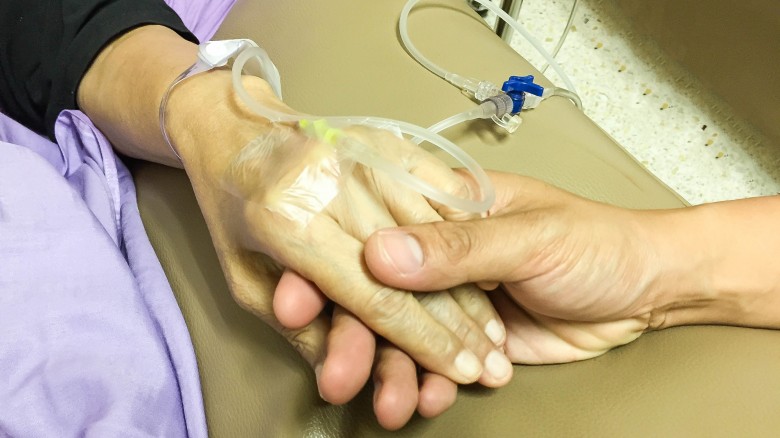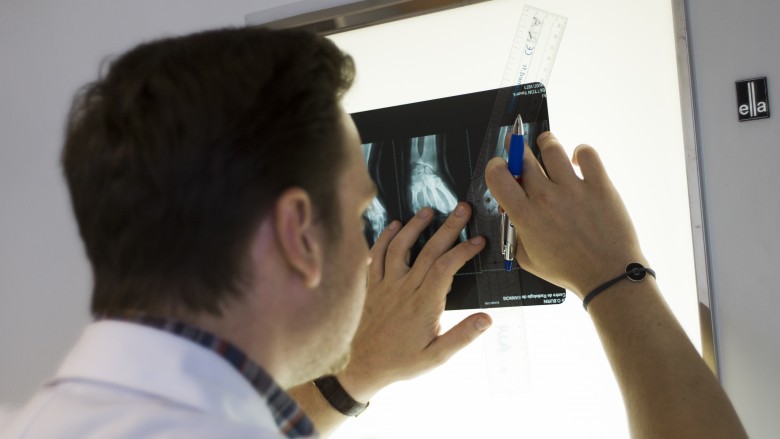Secrets Doctors Don't Want You To Know
We may receive a commission on purchases made from links.
Hopefully, when someone says "hey, watch this," a doctor is nearby to deal with the consequences. Medical professionals consistently perform miracles that our science-hating ancestors would have rewarded with a swift trial followed by human barbeque at the town square. But doctors are also human beings who are simply doing the absolute best that they can while doing what is one of the most difficult jobs imaginable, and their best sometimes isn't anywhere as good as we'd like to think. Here are secrets most doctors don't want you to know.
Cheerleaders pick your drugs
When selling any product, be it a hamburger of dubious nutritional values, a freemium video game, or a minivan, a beautiful face can and will be used to sell it. Modern pharmaceuticals are no exception to this rule. Sometime around the turn of the century, a marketing director for a pharmaceutical company whose name has been tragically lost to history changed pharmaceuticals sales forever. Rather than relying on an army of middle-aged, balding, socially awkward, and medically knowledgeable team of sales reps, it was decided that perky and outgoing college cheerleaders could push their products in a more efficient and profitable manner.
Every May, like clockwork, recruiters for pharmaceutical companies descend upon college campuses like a horde of struggling actors to a table of free food and hire as many graduating cheerleaders as possible. Cheerleaders, who have the uncanny skill of being able to show enthusiasm for anything while keeping the attention of a demoralized audience, are perfect for the rather dry field of pharmaceutical sales. A medical background or a scientific education is no longer required, or even helpful, for this new generation of pharmaceutical sales reps who rely on flashy marketing materials, swag, and a smile to push their products. On second thought, maybe it is good thing that the same cheerleaders who have brought so much joy and enthusiasm to so many fans now influence what antidepressants are prescribed.
There is a swag checker for medical professionals
When diligent scientists, computer programs, or engineers are done researching and developing a product, a marketing department takes on the monumental task of convincing us that their new product is essential to modern life. Sometimes, like when the product sucks, sales reps use the time-honored technique of burying their clients in swag to convince them to purchase their product.
Where a doctor's working, an attractive sales rep quickly arrives with a tray from Starbucks for everyone before taking the doctor out for lunch at a five-star restaurant. Sometimes during these lunches, the doctors are invited to attend medical conferences in well-known medical research hubs like Las Vegas, Hawaii, or Aruba. For some reason, doctors were not too keen on the general public discovering this practice, but now, regular people can go to a website to see exactly what type of freebies that their doctor has gotten from every pharmaceutical company in the business. Maybe a visit to the website is in order the next time a doctor seems a little too enthusiastic to prescribe erectile dysfunction medication after setting a broken arm.
Avoid emergency rooms in July
The month of July is without a doubt the most dangerous time to visit an emergency room at any hospital, especially a teaching hospital. See, on July 1, medical school graduates begin working on real-life human patients for the first time in their career. Regardless of how intelligent, talented, knowledgeable, and dedicated these new doctors are, nothing can change that it's their first time on live patients, and a frighteningly large number of mistakes will be made.
New doctors face the difficulty of learning how the soul-crushing bureaucracy of their new hospital works with the added pressure of having to keep people alive. Every mistake a new doctor makes in July has to be corrected by a more experienced doctor. The wrong tests are ordered, leading to even more tests being ordered, leading to hospital labs becoming overwhelmed with redundant tests to run, and patients die. One study conducted on this "July Effect" by Dr. John Young of the University of California estimated that the death rate for patients increases by 8–34 percent in July. With a jump in the death rate that staggering, it is almost worth waiting until August to get that sucking chest wound treated.
Medical empathy class is now a thing
Doctors spend a lifetime learning how to do kidney transplants, reattach limbs, and not display judgment when a patient shows up the ER on Halloween as Batman needing treatment for a shattered tail bone. Medical students lock themselves away from the world to learn the nuances of human anatomy and how to make their handwriting indecipherable to civilians. The business of medicine has changed and it is common now for doctors to not have regular patients, form professional relationships with them, or become invested in their care.
All of these factors have combined to create a generation of Vulcan doctors who are now taking professional development courses on human empathy. Doctors are now learning, or rather relearning, how to listen to their patients, how to not interrupt them while being asked questions, and how to establish trust. A scale exists, the Jefferson Scale of Empathy, to quantify the perceived empathy a doctor displays. These courses are increasing both the quality of care and patient satisfaction, which really is a win for everyone. With luck, IRS agents, retail managers, and landlords can begin taking these courses soon and learn once again how to human.
No one double-checks medical research
The astounding feats doctors pull off on a daily basis are built on a foundation of sound medical research. For example, one doctor might notice the health benefits of calling in sick every Monday to play video games and clear out the DVR backlog and will spend years accumulating data that either proves or disproves their findings. That doctor will publish their results, champagne and rose petals fall from the sky, and Leonardo DiCaprio will later play him in a biopic that gets an Oscar snub.
But here is the thing about medical research. There's glory, fame, and funding for publishing world-changing research, but there's little motivation to double-check that research. If new research is published and the right people sign off on it, that's usually the end of the story. Medical research is used to determine what type of care a patient receives, and bad research can and will lead to unintended consequences. All too often, no one takes the time to try reproducing earth-shattering medical research to confirm its results, so some medical research has the same vetting process as the celebrity death hoaxes that power social media.
Doctors have a secret language to insult you
When people are crammed into a small space and forced to interact with the public—i.e., employed—there's a tendency to create a glossary of secret terms to increase productivity and vent frustrations. In fact, ER doctors are extremely creative and use their respectability to shout medical-sounding terms that are camouflaged insults directed at patients and coworkers.
Doctors are human beings, and sometimes human beings simply do not like the person they are dealing with. A patient who a doctors says is suffering from incarceritis is probably going to jail after treatment is over. Gomers are patients the doctor hopes will "get out of my emergency room." (Due to snitches telling the writers of Scrubs and Grey's Anatomy about gomers, they are now referred to as "bed blockers" or suffer from "status gomaticus.") Male patients who recently employed independent contractors for financially procured female companionship might be suffering from Brothel Sprouts.
There are enough creative sounding medical insults to fill an entire book. Conveniently, one grizzled emergency room veteran, Dr. David Goldman, did collect all of those terms in a book written for non-medical types. The Secret Language of Doctors is highly entertaining, and reading it before a visit to an emergency room will make the trip all the more interesting.
Doctors know your medical bill is insane
In Miami, Chicago, or Seattle, a Big Mac costs around the same amount, more or less. Same with an iPhone, or a Gulfstream G500 private jet with a tasteful interior. Yet a Band-Aid purchased at hospitals in those different cities would have drastically different prices. There's no logic or reason to explain how hospital billing works, and doctors know this. In Los Angeles, the price of pneumonia treatment can jump by as much $100,000 depending on what hospital a patient gets treated in. A knee replacement that costs $12,000 in Atlanta costs 15 times as much in New York City.
This insanity extends down to everyday items that can be purchased at a corner drug store. One aspirin in a hospital can cost as much as the case of beer that created the need for that aspirin, and a single diaper for a newborn costs the same amount as a newly released video game that includes a season pass for the DLC. It is highly probable that the billing departments at major hospitals are run by Red Bull–chugging monkeys that randomly pick dollar amounts out of a jar when compiling a hospital bill. While it's probably a good idea to ask a doctor questions about a change in diet, treatment alternatives, or where single doctors hangout, it is probably not a good idea to ask them how much a hospital visit will cost because in all likelihood, they do not know.
Doctors have to lie, a lot
Lies, along with showing up to work relatively sober and fully clothed, are sometimes essential in order make it through a work day. Putting the pesky morality of lying aside for a moment, doctors know that a well-executed lie could make the crucial difference when treating a patient. Doctors regularly tell white lies to dementia patients to more efficiently treat them. Sometimes, doctors employ what they call "benevolent deception" when choosing to withhold certain aspects of their diagnosis in the hopes that a positive patient attitude will provide a crucial moral boost during treatment.
Unfortunately, doctors can and do employ lies for more nefarious purposes while on the job. A survey of 1,891 doctors had some rather frightening results. Nearly one-third of doctors surveyed admitted to not reporting serious errors they made, and two-thirds admitted to not being entirely honest about their financial relationships with pharmaceutical companies when asked by their patients. It is not unheard of for some doctors to flat out lie when covering for themselves, a colleague, or even while testifying at a malpractice hearing. As with The Force, good medical lies provide hope to a terminal patient or a fledgling rebellion. Dark medical lies, again like The Force, can be used for more sinister purposes like deflecting a malpractice lawsuit or allowing for the prequel trilogy to happen. It all comes down to intentions.
Your ER doctor probably did not look at your X-Ray, MRI, or CT scan
Recently, hospitals, like national pizza chains, have begun taking advantage of the falling prices of high-speed Internet connections to outsource traditional operations. The emerging field of teleradiology has allowed hospitals to outsource their radiology department.
Traditionally, like when someone misunderstands the concept of gravity and the density of concrete, a trip to the emergency room is in an order, an X-ray would be given, and a radiologist on site would evaluate that X-ray to determine what treatment is necessary. Now, with teleradiology, rather than an X-ray, CT Scan, or an MRI being evaluated on site, a digital copy is sent to an offsite location where a doctor hundreds of miles away evaluates it to determine the best course of action.
The fastest Internet connection in the United States currently belongs to a teleradiologist who trolls Call of Duty players during his downtime. What all of this means is that there's a relatively good chance an ER doctor providing treatment never looked at the X-ray, which might be a good thing for patients hoping to avoid awkward conversations with a doctor.







